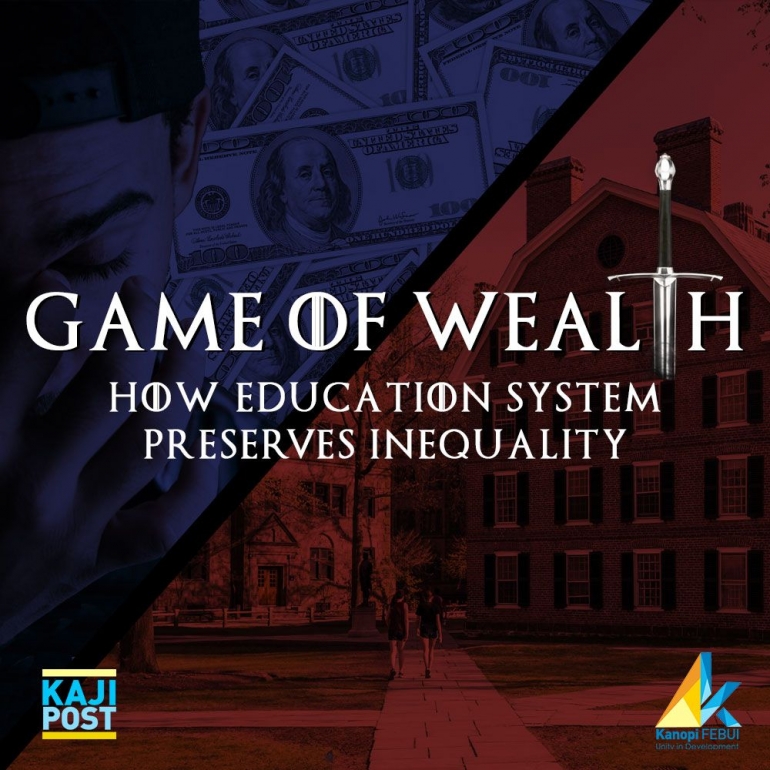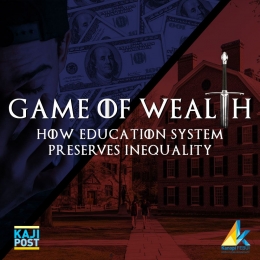Furthermore, besides talking about inequality in terms of overall wealth, we have to be aware also of the existence of inequality within the admissions process. Daniel Golden, author of "The Price of Admission", said that those best-schools indeed put more preferences toward the wealthy. As once he put it that based on economic diversity, it is already considered as the least diverse element in the admissions since it only counts for 3% to 11% of applicants that come from the lowest economic quartile. Don't get shocked too soon though, because all the talks which claimed elite universities will go for a more well-rounded student thus giving the chance for the less wealthy to catch-up with the criterion is proved to be mere talks. Instead, exceptional students with exceptional talent, let's say in music, sports, you name it -- will get more weight in their admissions' applications. And we know it too well that to be someone whose exceptional, it won't come in handy and cheap, we need to also pay for the trainers or the private lesson -- another signal of privilege for the wealthy.
It's like a never-ending vicious cycle of wealth circulation. It can be well said that our society is far better at preserving inequality than it is in preserving ocean which is overflowed with plastic.
The Goal of It All: More Inequality
So, what can we imply from wealth inequality above? It means that more people are witnessing stark differences between each social class -- more people want to preserve its position in their current wealthy status if they are rich, as others that may not be as fortunate want to climb the social ladder as well. Getting less rich becomes scarier than it has ever been before and the competition to preserve it is getting higher, resulting in increasing willingness-to-pay for price to perpetuate the social order.
Once the United States was considered to be the land of opportunity, but the naked truth is it's not anymore now (or ever?). The problem caused by previously elaborated inequality ends up producing more inequality. How so? Based on the study that calculated intergenerational mobility, the upward absolute mobility (children's education compared with their parents' education) in the U.S. has been declining from 90% for children born in 1940s to 50% for children born in 1980%. This condition is mainly due to the unequal distribution of economic growth, rather than the slowing pace of economic growth itself. It is very essential as if we want to reach an increasing number of upward mobility, we can't just take into account the pace of economic growth, but also the way it is distributed. For now, a large fraction of GDP will go to higher-income household so that no matter how much of economic growth being incurred, it won't change the current status quo if it's not distributed evenly. Besides that, the decline in the United States' equality distribution can also be attributed from the fact that globalization decreases return to uneducated labor (Kanbur, 2018).
In addition with that, as this world is already used with having the idea of social stratum that distinguishes the rich and the poor, the probability of poverty-to-privilege rate has been declining as well. This implication can come from the fact that the upward mobility rate itself is getting narrower, meaning that if we interpret it in terms of education attainment, it's getting much harder for the bottom half kids to reach higher educational quartile than their parents.
To minimize further the downturn of admissions process, there has been an idea to just replace the current admissions process with another process known as the admissions lottery. So, the basic would be universities will determine first on the kinds of quality they seek from a student and then after it has been sorted out from that basic criteria, they will pick students randomly so that it will eliminate other factors not being included inside the criteria -- just like a lottery. Besides eliminating the factor of wealth, it will also benefit students psychologically as they don't have to stress about being treated unfairly just because the assessors will be more likely inclined toward the wealthy.
Seeing how the scandal is being unfolded in front of our eyes along with its cause and effect, we realize that we live in the world where the real meritocracy is, most of the time, considered as threat. This scandal can be a loud wake-up call for all universities, not just those in the U.S. but also all over the world, to reconsider their admissions' system as it won't just determine someone's 4-year worth of education but also the future of social order and stability.
Oleh Sendy Jasmine Karunia Hadi | Kepala Divisi Kajian Kanopi 2019 | Ilmu Ekonomi 2017
References:
Arcidiacono, P. (n.d.). EXPERT REPORT OF PETER S. ARCIDIACONO: Students for Fair Admissions, Inc. v. Harvard (Rep. No. 14-cv-14176-ADB (D. Mass))











